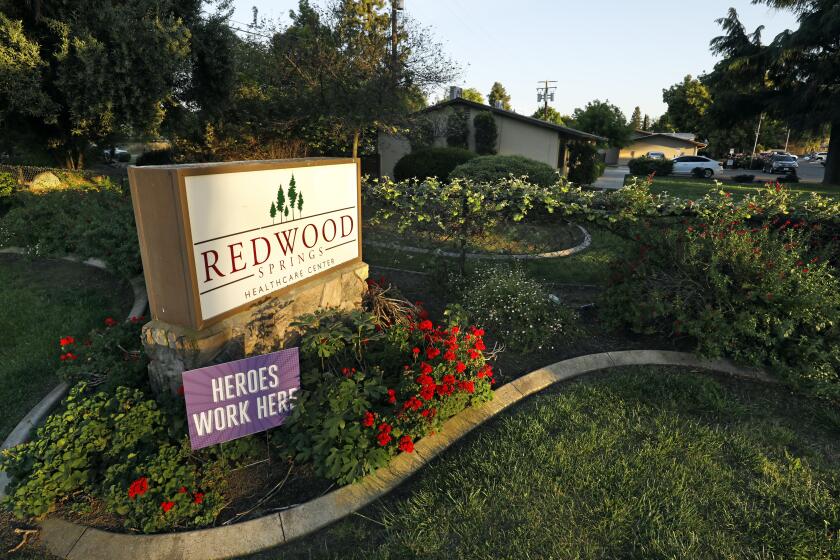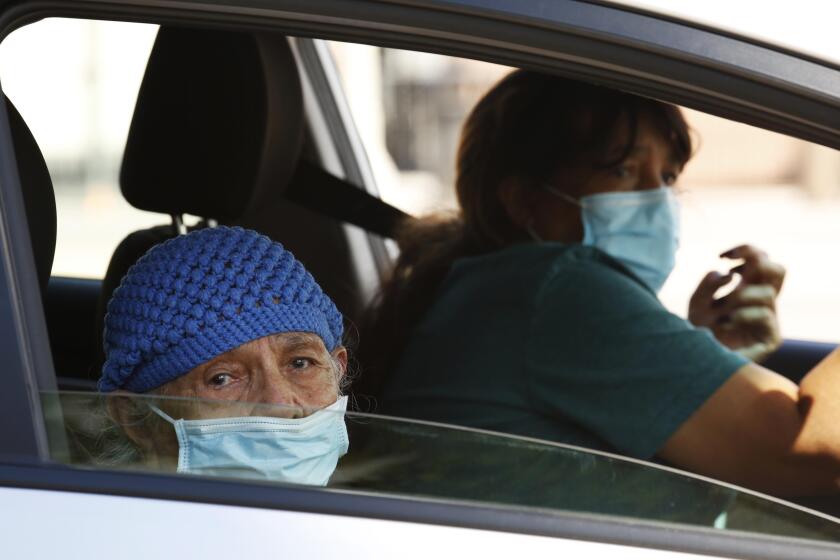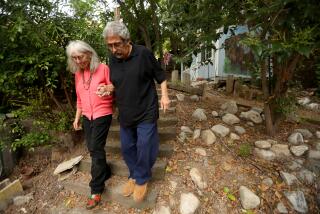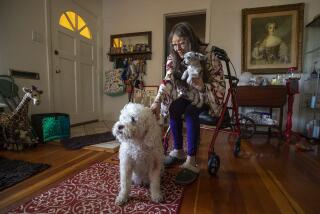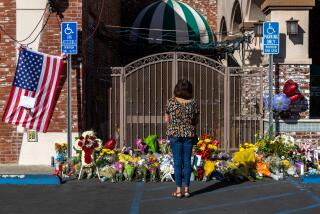His wife died while both were in a care facility. Lonely, he dreams of post-pandemic love
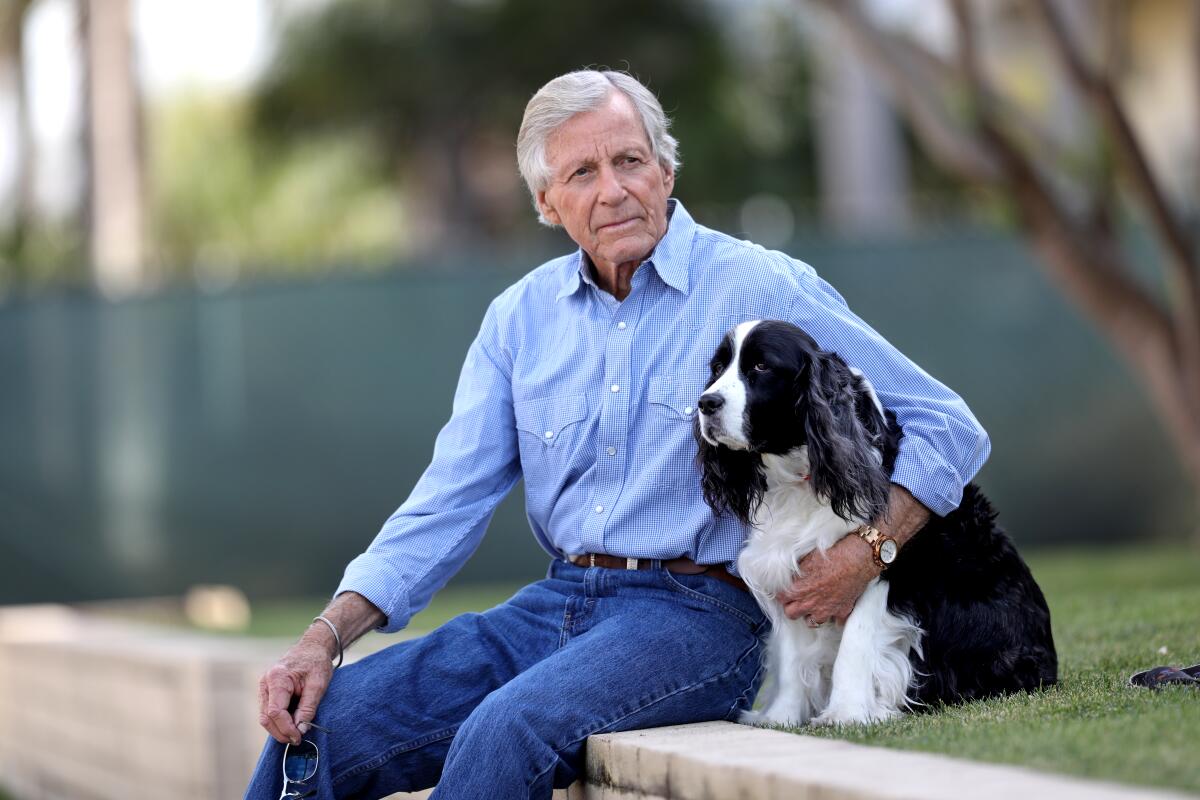
At 85 and in an assisted living facility, Len Maisch has been thinking about his childhood holidays, when his alcoholic mom went drinking, leaving him and his brother alone at Christmas.
After 10 months in coronavirus lockdown at his Redondo Beach complex, he’s feeling the same sense of isolation and irrelevance that overwhelmed him as a kid.
“I feel abandoned. I am feeling desperately sorry for myself,” he said recently. “Doesn’t anyone have any empathy for us?”
Like thousands of people weathering strict rules inside nursing homes and assisted living facilities, Maisch is grappling with the social costs of his safety as the pandemic continues to decimate congregate care settings, killing older people at alarming rates. A recent survey unsurprisingly found that 3 out of 4 nursing home residents felt lonely under the restrictions.
Clear-eyed about the risks of COVID-19, Maisch is also emotionally drained by watching his human contact dwindle to a handful of healthcare workers and administrators. As the first doses of the vaccine are administered, with promises they will arrive soon at facilities like his own, Maisch is fighting to stay positive as the year winds to a close, sharing his story to connect with others in similar circumstances, and with those in a world he fears has forgotten them.
“I only hope that this might help someone else who is lonely and forlorn in the midst of this,” he said. “You have to have faith and we can get through this, but you have to have a lot of endurance.”
Across the United States, about 1.2 million people are being cared for inside skilled nursing facilities, and another 800,000 reside in assisted living situations. Some of those facilities haven’t allowed visits in months. Some began them only to cut them off once again as community case numbers rose and outbreaks occurred.
But increasingly, families of those in lockdown have been pushing to ease restrictions on visitations despite the continuing spread of the virus as the emotional, physical and mental price of confinement becomes apparent.
“I think it went too far,” said Dee Ann Pope, whose father resides in a skilled nursing facility in San Clemente. Though she sits outside his window and they play bingo using cellphones, she believes she has seen him decline without close contact and outings. She has joined with others in a national effort to find a compromise with nursing homes that would allow entrance to designated essential caregivers, who follow strict safety protocols like staff.
“It just doesn’t make sense that we can’t give them that emotional support without them feeling they are in a zoo,” she said.
Maisch’s story differs from that of many of his counterparts because he doesn’t need to be in a nursing home. A former high school sprinter, he’s kept his body trim and his wits sharp, the only sign of his age a slight hitch in his gait from a back surgery that damaged a nerve.
But he made the decision to move into this facility in February to be with his wife JoAnn, then 71, who was diagnosed with a fatal and degenerative brain disease that had already robbed her of the ability to walk up and down the stairs of their Palos Verdes home, a place they had purchased only three months prior because it was big enough for his grandkids to visit. They sold it, both knowing her condition was growing worse.
“When you have someone you truly love, you try not to leave them in a facility alone,” Maisch said in April, when he first spoke with The Times. “She’s a beautiful flower, and she’s wilting, and so all you can do is give her love.... I can’t love her enough. I can’t kiss her enough.”
A month after the couple arrived, the pandemic escalated and the facility went into a lockdown. At first, Maisch wasn’t too bothered, believing it would end soon. But the days turned to weeks with no improvement.
“Then it started coming down on me because I was looking at the world through blinds at a parking lot,” he said. “It was pretty tough, but I loved her so much it didn’t mean anything doing it.”
By April, the coronavirus had made it inside the facility, as it had in hundreds of other care homes across the state and nation. Residents died, and strict measures were put in place on where Maisch could be and when. His May birthday came and went with no visitors and little to celebrate.
“It was just another day,” he said.
Coronavirus has swept through skilled nursing facilities nationwide, killing hundreds. In California, one company controls numerous homes with outbreaks, including a hard-hit facility in Tulare County.
When Maisch speaks of his past, before JoAnn fell ill and before the virus, it’s less with nostalgia than slight outrage that he’s been sidelined from a life he was having fun living. Though he grew up poor on the Westside, living for a while on Venice’s streets before they became chic, in “flop hotels” as he describes them and in an Inglewood house where he spent those forlorn Christmases, he ran his own business selling machining tools to the aerospace industry in its heyday, traveling the world to meet with clients who became friends.
With that success, he joined the swank Jonathan Club in 1970, with members including Ronald Reagan. New Year’s celebrations were spent in its formal dining room with an orchestra and 10-course meals. Summer days, he’d hang out at its beachfront outpost in Santa Monica, just behind Lifeguard Tower 8, where he used to work as a teenager.
His membership number was 123, easy to remember. But the club knocked him to emeritus status, and now it’s 00. “I don’t like the sound of it, to be honest with you,” he said, some kind of sign that the past is just that.
But he was also a hustler, driven by his childhood poverty, “always in a dead-ass rush all the time,” he said, “about better ways to improve myself and improve what I was doing.”
He met JoAnn in the lobby of Hughes Aircraft in 1986 and a few weeks later took her to a somewhat unsuccessful lunch. But he persisted, and after a few more promising encounters he invited her to a weekend at the Biltmore in Santa Barbara.
“From that moment on, our relationship changed,” he said. “That was it, from then on.”
When JoAnn died on Sept. 21, Maisch was holding her hand, quietly sitting by her side.
By then, she was bedridden and drifting away, and a new kind of loneliness was already taking hold of him.
Eleven days before, she had been well enough to shower and put on makeup with the help of aides. He remembers her lying on the bed in a light blue nightdress, “and I looked at her and said, ‘Do you know something? Right now you are as beautiful as you have ever been in our life.’”
She smiled, with “that tint in her eyes” that he cherished. It held the spark of her humor, intelligence and kindness. And love.
“That was the last time,” he said. “She kind of went back into relief, so to speak, just in her own little world.”
A few weeks later, he left the facility for the first time for her funeral. Donning a suit he hadn’t worn in two years, he struggled with the Windsor knot on his gold and blue tie, but he made it perfect, because details like that matter. In the courtyard of their Episcopal church, with a few close friends and family, he said goodbye.
Back in his solitary rooms, in a two-week quarantine to make sure he hadn’t brought COVID-19 back with him, the real parting began. The silence. The emptiness. The inexplicable unfairness of loss. He grew up in an era when men held their emotions in, but this grief was too much.
“I’ve never shown myself crying my whole life. But I was shuddering on the bed,” he said. “And I didn’t want to talk to anybody.”
But he also couldn’t bear to be alone. He hired a caretaker for three days, six hours a day, just to sit in a chair and be there. The tears stopped, but the burden of the past months won’t relent.
Feeling trapped inside the facility, though all his needs have been met, has “changed me an awful lot,” he said. His stagnant life has aged him.
His saving grace is Sophie, his springer spaniel.
“Thank God I’ve got her because I can talk to her,” he said. “She is sensitive to all my feelings. If I cry or something ... she runs up and puts her head on my lap.”
Every morning, she wakes him up at 6 a.m. to go out on their little patio. Then they sit together until someone brings his coffee and newspapers at 7 a.m. Then they sit together some more.
Now, as Maisch begins to see beyond his grief, he’s trying to figure out how to get out of his facility and on with his life. He and JoAnn spoke often about wanting the other to move on. He’d made three of his friends promise to introduce her to “a very successful gentleman that wants a nice lady in his life,” if he were to pass first.
“We joked about it, but I was serious,” he said. “I must learn to put her in another place or I will be beating myself up for five years.”
That won’t happen until he’s out of this place, he knows.
“Sometimes, I would like to pole-vault that back gate and escape,” he said. But it’s not that simple.
Elders and caregivers both need help during the coronavirus pandemic. Here are some tips, as well information of how the stimulus bill affects seniors.
Though he has family, he doesn’t think living with them would work. He called hotels up and down the beach, but none are offering room service anymore, and he doesn’t want to take the risk of going out for meals. Renting an apartment during a pandemic seems daunting and a bit foolish, he said. He has a friend who is a real estate broker, and he’s toying with the idea of finding something to buy, where he could have a garden like the one JoAnn used to tend.
But for now, he sits in his rooms, with their white walls and photos of JoAnn — as a little girl, in a silver oval frame; in a low-cut evening gown at one of those Jonathan Club events — and dreams about what may come next, hoping that “maybe there is a chance for me.”
This New Year’s, he knows there will be little to lift his spirits other than the end to a devastating year. No black tie. No party. No midnight kiss to ring in better times.
His plans are further in the future — some firm, others spontaneous. He is known to ask his female aides and callers if they would like to run off with him, Majorca maybe, all expenses paid. Or at least join him for lunch. For his 90th birthday, a few years away, he has a deal with a friend to be in Santorini, drinking Johnnie Walker Black Label scotch, smoking cigars and wearing Panama suits while they “dance until dawn.”
And somewhere, not here and not too long from now, he hopes to find connection again. Conversations. Travel. The comfort of someone who wants him near enough to hold.
“I am craving for someone to show some love and affection to me,” he said.
More to Read
Sign up for Essential California
The most important California stories and recommendations in your inbox every morning.
You may occasionally receive promotional content from the Los Angeles Times.
